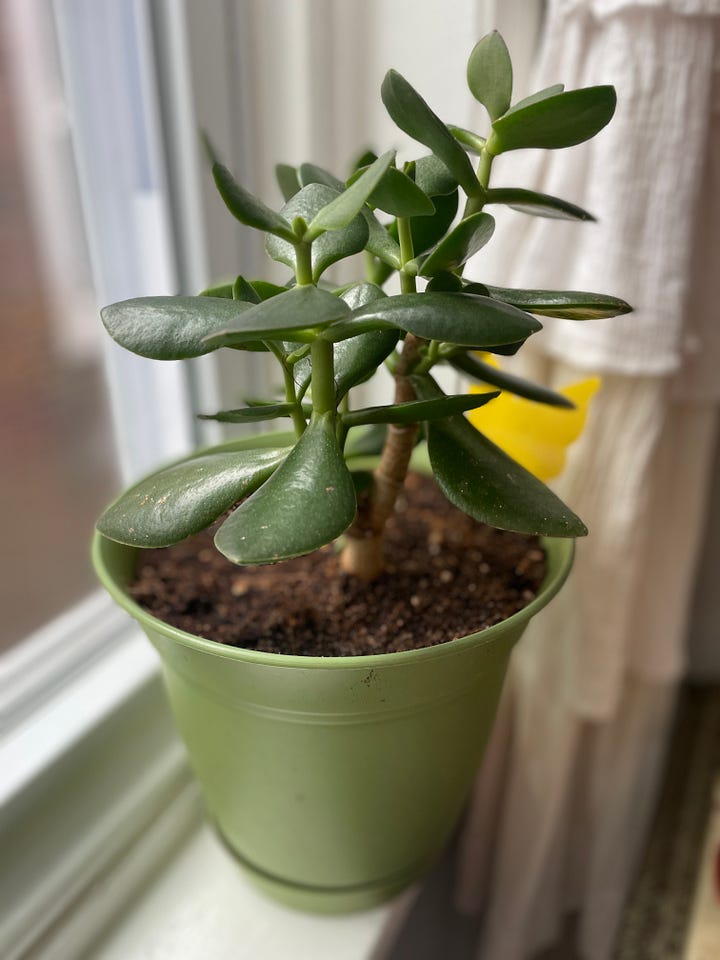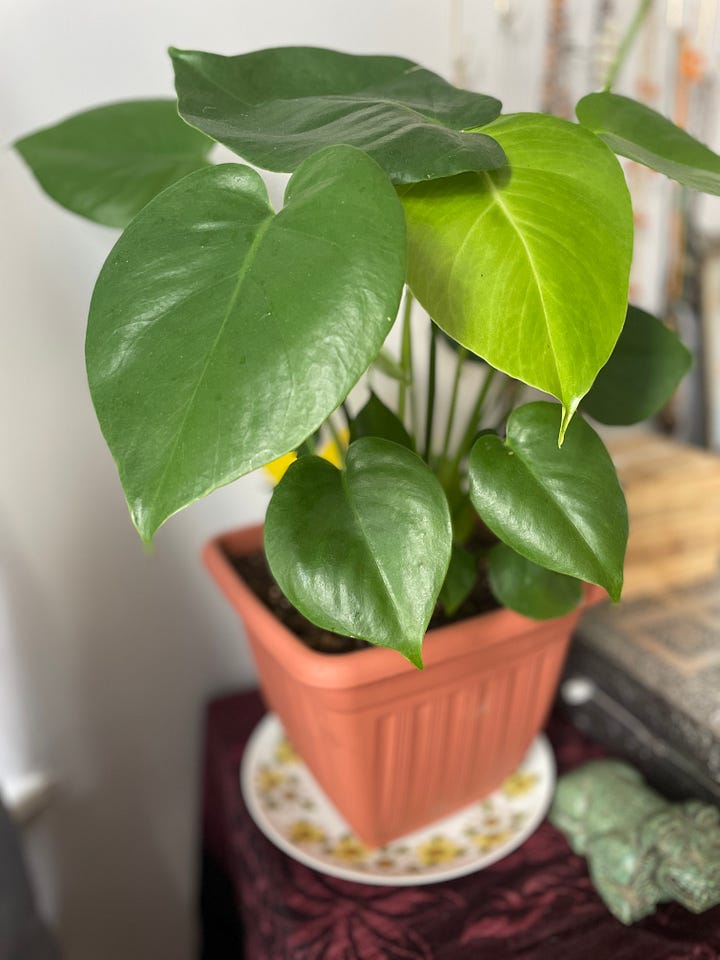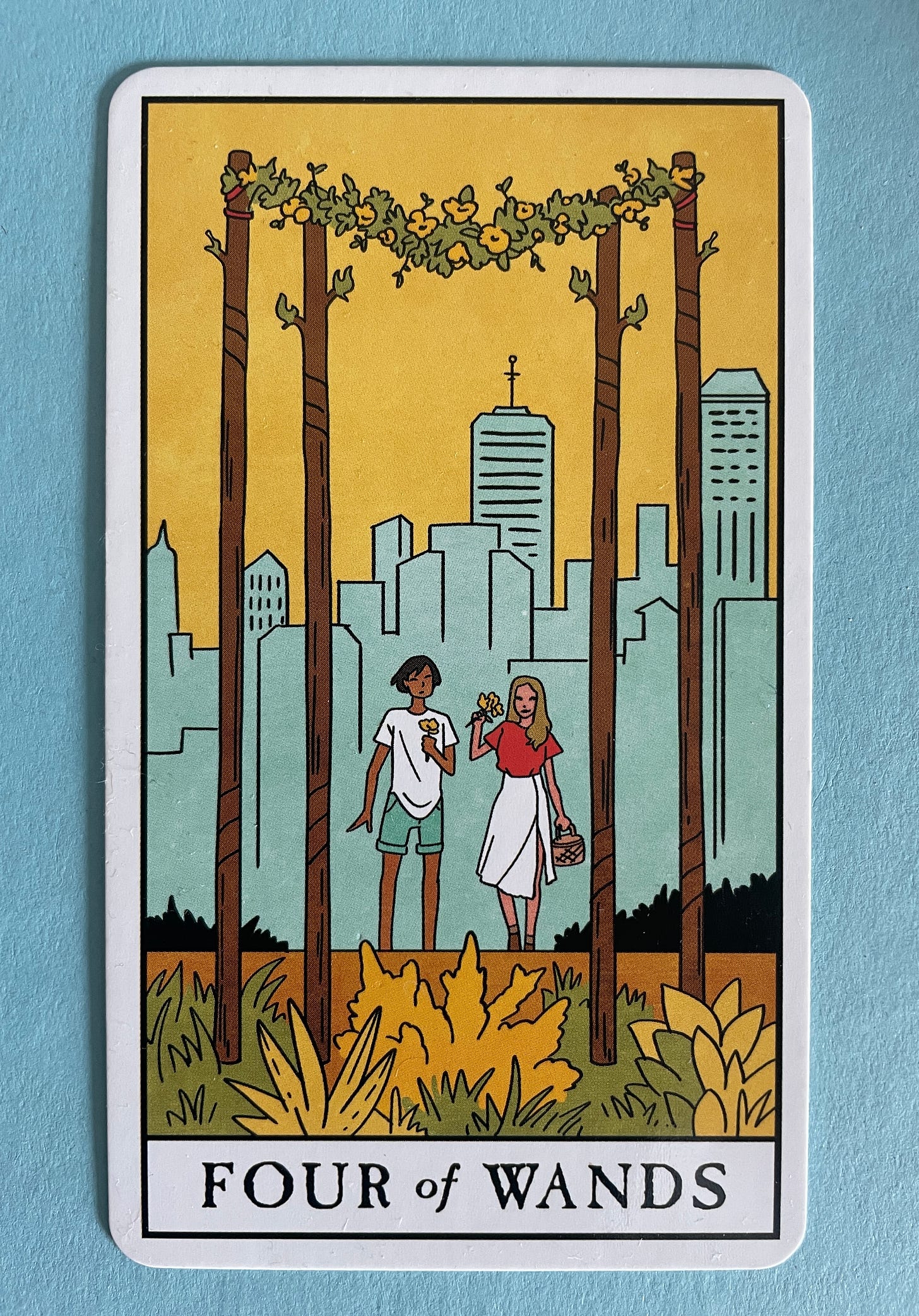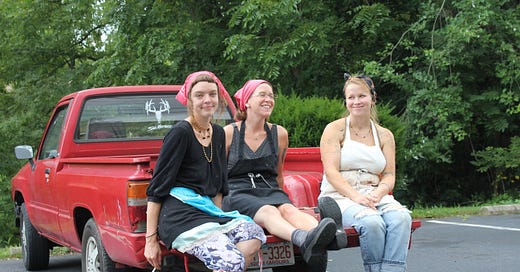Solstice time is so bittersweet.
I love the summer, I love the great, lush canopies of trees in leaf and fruit, the umbrellas of elderflowers, those showers of stars—the passionflower and the St. Johns wort blooming, a black dog sitting calmly in the middle of a vast field in a gentle rainstorm, a box of free kittens on the street corner by the farm stand.
I love the summer so much but it breaks my heart. At winter solstice, there’s nowhere to go but up—all the world moves slowly, growing steadily towards the light—but at summer solstice, I just can’t help feeling like it’s all downhill from here: the sun hit its peak of power and turns the corner of the year towards winter, towards bitter winds, towards cold, dark nights.
Lately, I have been missing the cake shop.1 Last night I had a dream that I went there and the guy from The Bear was the new manager and he had changed all my recipes, the cream cheese icing was cold and sour and the lighting was all wrong and I started give directions, correcting him when, sheepishly, I remembered that I no longer owned the place, that I didn’t belong there anymore.
I miss it all. I miss all the gorgeous, cool, smart gurlies who worked there with me, I miss smoking across the street in the flatbed of Emily’s pickup truck, when the “cidery” was still the electrical workers union hall. Not a day goes by that I don’t think about Lucy answering the phone as her alter ego Crystal (pronounced CREE-IST-UHL), a true comic genius, that Luciann; or playing April Fools’ pranks on the custies, or Hannah’s mind-blowing artistic precision (we called her Caketron 3000), or falling on the floor laughing with Jess, with Anna, with Olga, with Chloe, and when’s the last time you got to be so lucky as to work with a tenderhearted former rainbow kid/juggalo named Duggles? Our unofficial mottos were “always hungry, so tired” and “never forget, never forgive.” I never did get those t-shirts printed up. I miss it all.
Last week I told my therapist that sometimes I feel ashamed of how I left Asheville and moved to Philadelphia in the dark of the first pandemic winter, how I just quit and walked away, making no announcements, offering no ceremony or closure, that selling the cake shop felt like a failure, that selling the house felt like a betrayal, that I walked away from a place I belonged—a place that made sense to me—a place where I made sense—for all this unfamiliar terrain. Now that those times are gone I think of the words of Toni Morrison: “I remember everything as a mistake, and I regret everything.”2
My therapist asked: would you trade what you have now to have it all back?
Even if I could, of course I wouldn’t. The river only flows in one direction; we can’t be un-born. As Thomas Wolfe reminds us, “you can’t go back home to the old forms and systems of things which once seemed everlasting, but which are changing all the time.”
The truth is, I had to change. I had to walk away. However clumsy and inelegant the execution was, however much I bundled up all my absence and lack and carried it with me on my back, I needed to be made new again.
I’ve been digging into my bins of old journals recently, and though my memories of the cake shop days are rose-colored, the reality was a little more nuanced, like in this entry from June 2015:
I have been feeling so hopeless and disappointed lately. Sales are down at the Cake Shop and I’m shutting down emotionally with all my employees after having to fire [redacted] for a juvenile betrayal in which she [redacted]. I feel rejected and disrespected and I don’t understand why Fate has brought me to this place. Above all, I feel angry at myself that I’m so mad and sad, when most of what is happening in my life is incredibly positive and beautiful.
I quit drinking on Sunday [editor’s note: I didn’t]. Saturday night I got blackout drunk and surly at [redacted]’s house. I’m too fragile and depressed to drink. I need all my resources, my rest, my clarity.
I feel so confused about my path. I love the Cake Shop for a million reasons. And yet, the Cake Shop isn’t working. I can’t make it make money without compromising my values. I feel stifled in my creativity because I have to keep up appearances. I’m heartbroken every time an employee leaves, or does something so egregious that I have to fire them. And customer service, day after day, year after year, can steal your soul right out from under you, and make you sarcastic, contemptuous, and bitter.
The bins of journals and letters (some of which, confusingly, my mother had bundled and mailed back to me in a big manila envelope) also documented my slow and painful breakup with my family, relationships that ended not with a bang but a whimper. There were letters from my pregnancy and early years of parenting, including my separation from Duncan, politely and calmly asking my family to respect my boundaries (“I ask that you respect our privacy by not using my story as your own.” “If you don’t stop criticizing my choices around my birth I will need to limit my time with you.”) Reams of reasoned and rational requests for respect and autonomy, panicked but measured bids to keep my place in my family, years of attempts to negotiate what turned out to be an impossible deal, that I could be myself AND be one of them.
Ultimately, after a lifetime of boundary violations, drunken arguments, desperate, impassioned pleas—thinking if I could JUST get them to understand, if I could JUST be more rational, more articulate, more CLEAR—I gave up. The rifts became chasms. Over the next few years, I slowly backed away until, one day, I just didn’t respond to one text, or the next, or the next.
Sometimes, giving up hope, letting the old forms die, is, paradoxically, the only way that hope can live. In her essay “love is a necessary ritualistic indebtedness to spirits seen and unseen,” Kelly Moody says:
There is always some hope, and giving up hope is the only way to actually give space for hope that someone will find their own way, and it may mean that your absence is necessary for your own safety and for their own change. And maybe they will demonize you for not subjecting yourself to their mess anymore, or maybe they will realize that it wasn’t you at all…. Maybe something will happen that will make them realize that life is short, love is great, the spirit’s hungry, and that our choices change the course of universes. But, sometimes you have to give up that it is possible, because it too is often not possible.
This morning as I was strolling to the Arboretum to pick up my CSA box from Philly Forests, Jasmine messaged me to let me know she had stashed a gift for me behind the farm stand: a bouquet of elderflowers and a perfect little jar of blueberry lavender jam. This small but profound gesture made me feel that I belong here, that I can make a place for myself, that I can make a home in the world wherever I go.
Solstice time is bittersweet, but what if solstice never came? What if the days kept getting longer forever? Too much of a good thing is actually a nightmare, a glut, an infestation. Sic transit gloria mundi. All things must pass. You can’t go home again, but you can revisit the old land with fresh eyes, each season a new season, your own self made new again and again. Bless the summer, the blueberries, the heat and the light, and bless the winter, the fallow seasons, and the cold and the darkness, too. Bless the bitter, and bless the sweet.
Home
An update in the ongoing saga of my fungus gnat pestilence: last weekend, having exhausted all other options and while losing my entire mind I repotted ALL my houseplants, washing the pots and the roots and planting them in fresh soil that promised to be “fungus gnat resistant” due to containing no compost or bark (it was very light with coconut fibers). It was the only way. So far, they seem very happy, and no sign of gnats. However the life cycle is 17 days, so we are not out of the woods yet. As always, I’ll keep you abreast of this emergent situation.


The World
Pride means no vacancy for fascists, part 3:
Moms for “Liberty” will arrive in Philadelphia this week, ready to party at the Museum of the American Revolution, enjoy the accommodations at the Center City Marriott, and harass librarians and queer and trans kids at the Free Library’s Pride events. Follow ACT UP Philly’s instagram and Defense of Democracy PA on twitter for more information about how you can get involved and defend our sacred trans and queer community, essential Black history and civil rights teachings, and the integrity of public education.
For even more context, here’s a couple of links:
“It’s been a week. As a TV writer and Los Angeles Unified School District parent, I’ve bounced between WGA picket lines, school pick-ups, and fighting Proud Boys. I wasn’t expecting to be here. The bewildered retired librarian I chatted with outside the Glendale Unified School District Board meeting last Tuesday also wasn’t expecting it. You’re probably not, either. Welcome to the new battlefield in public education: fighting violent paramilitary groups outside of your child’s school.” Read the rest here.
From MSNBC: “Moms for Liberty, the shadowy right-wing group whose members fashion themselves as fierce "Mama bear" types, is yet again facing controversy over extremist ideology in its ranks. An Indiana chapter of the organization issued an apology on Thursday after a recent newsletter it sent to its members included a quote attributed to Adolf Hitler. NBC News reported: ‘The Hamilton County chapter of Moms for Liberty quoted Hitler’s remarks at a 1935 rally on the front page of its new newsletter on Wednesday. The quote, placed directly below the masthead, read: “He alone, who OWNS the youth, GAINS the future.”’

A Card

According to Labryinthos, “the meaning of the Four of Wands is that it heralds celebration as well as a harmonious, happy and relaxed home environment. The number four symbolizes stability as well as particularly reliable foundations. These are associated with a period of happiness and balance.”
May you find your home in your own heart and in the hearts of those you love; may you find belonging and celebration, wherever in the world you may go.
Home + The World features personal essay, recipes, links and recommendations exploring the ways we become exiled: through trauma, addiction, oppression, grief, loss, and family estrangement; and the ways we create belonging: through food and cooking, through community care and recovery and harm reduction, through therapy and witchcraft and making art and telling stories and taking pictures and houseplants and unconditional love and nervous system co-regulation and cake. Currently, all content is free; the paid subscriber option is a tip jar. Y’all have been so incredibly generous, and it’s truly amazing, humbling and astounding. Thank you. If you feel so moved, please share this newsletter and help me grow my readership! I thank you so deeply for being here and I thank you for being you.
⚔️❤️ Jodi
Short Street Cakes, the bakery in Asheville, North Carolina that I started, ran for 10 years, and sold in 2016 into the capable hands of Olga Perez, who still runs it beautifully today. Go see her!
From a 2015 interview with Terri Gross:
MORRISON: I never worried about it. When I had them, when I, you know, lived among my family and then just myself and my children, when they went to school, I never did think that I would hurt them in any way while it was going on. Afterwards, I remember every error, every word I spoke that was wrong or incontinent, every form of when I did not protect them properly (laughter).
Now that I'm 84, I remember everything as a mistake, and I regret everything. Now, mind you, one of them is now deceased. One is very successful. So I don't have any reason for this except perhaps age and regret, but I always thought I was able and competent all the while I was rearing them.
GROSS: Yeah, I want to say, your younger son died of pancreatic cancer. I was very sorry to hear about that. That was a few years ago, and he was in his 40s...
MORRISON: Yes.
GROSS: ...When he died. Why do you think that later in life you started focusing on everything you thought you perhaps did wrong?
MORRISON: I guess I'm depressed (laughter) I don't know. I can't explain it. Part of it is the irritability of being 84, and part of it is being not as physically strong as I once was. And part of it is my misunderstanding, I think, of what's going on in the world. And so writing, for me, is the big protection. But when I'm not creating or focusing on something I can imagine or invent, I think I go back over my life (laughter) - I don't recommend this by the way (laughter) - and you pick up, oh, what'd you do that for? Why didn't you understand this - not just with children, as a parent, but with other people, with friends. So it's a long period of - it's not profound regret. It's just a wiping-up of tiny, little messes that you didn't recognize as a mess when they were going on (laughter).





